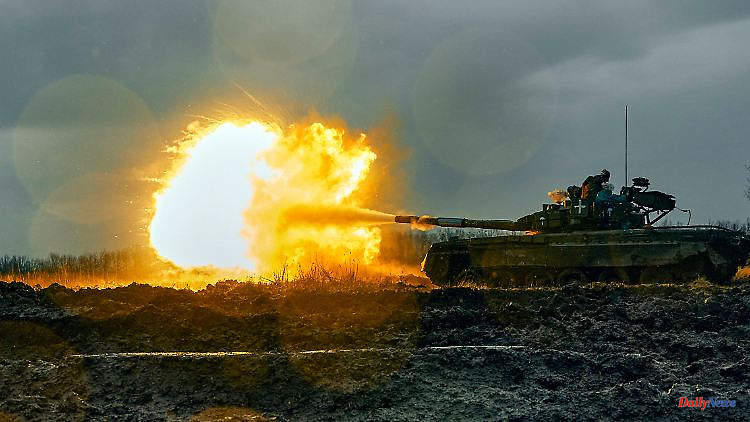The CDU foreign policy expert Roderich Kiesewetter assumes that the USA will soon urge Germany to become more involved in Ukraine. "If we deliver Western main battle tanks to Ukraine, it's about improving the survivability of the Ukrainian armed forces," says Kiesewetter in an interview with ntv.de. "The Americans expect more from Germany here."
Kiesewetter accuses the Chancellor of having "allowed himself to be unsettled by the Russian narrative that it would be a provocation if German tanks were used against Russian troops." The goal must be for Ukraine to "at least restore its January borders" - and for Russia to lose the war. That means "expressly not regime change from outside, because no one is attacking Russia".
ntv.de: You were at a security conference in Halifax and before that in Washington. Do you fear that the new Republican majority in the US House of Representatives will try to prevent support for Ukraine?
Roderich Kiesewetter: No, quite the opposite. We have met several Republican senators and congressmen who have made it very clear that they stand with Ukraine. Support for Ukraine is bipartisan in the US and will not wane. Rather, I think Republicans will demand more from Europe, especially Germany. In our talks with the foreign and defense ministries, it also became clear that Washington would like more German support, for example the delivery of battle tanks.
How do you assess US President Joe Biden's position on the war in Ukraine? He always says that "nothing should be decided about Ukraine without Ukraine" - but the US does not supply long-range HIMARS ammunition to Ukraine because of fears that Ukraine will use them to fire on targets in Russia.
In doing so, the US wants to make it clear that it supports Ukraine in its goal of restoring territorial integrity without contributing to an unnecessary further escalation. This is a de-escalatory step that Russia has not yet acknowledged. On the contrary: by the end of October, the Russians had attacked around 22,000 civilian targets in Ukraine, but only around 300 military ones. I can therefore imagine that the USA will reconsider its stance.
Why doesn't the US itself supply tanks to Ukraine?
I also asked the people I spoke to in Washington and Halifax. The Americans would be willing to supply main battle tanks. Theoretically, the Abrams main battle tank would be an option. There are three arguments against it. First of all, the Americans say that separate logistics chains would have to be set up for the Abrams because they don't exist in Europe. It would be different with the Leopard because it is used by 13 European countries. The Marder armored personnel carrier is also widespread in Europe. The second argument is consumption, which is much higher with the Abrams or the Bradley infantry fighting vehicle than with the Leopard and Marder. If Abrams run on kerosene, they need at least two and a half times the Leopard. Bradley and Abrams are also much more serviceable than our relatively tough Leopard tanks - the Americans learned this bitterly in the Gulf Wars.
And the third argument?
... is also understandable. An Abrams weighs more than 60 tons. The Americans have limited transport capacity - with the same transport capacity, they can deliver three HIMARS on their ships or in their transport planes.
Is there pressure from Washington on the federal government to supply battle tanks to Ukraine? So far, the only public statement on this has been the US ambassador in Berlin, who said in September that her expectations of Germany were "even higher" than what had happened before.
There are very clear indications that the US government is letting the Germans do what they do. But as a sign of burden-sharing, they expect Germany to jump over its shadow and finally deliver tanks. That's what I've been told by senior interlocutors in the US State Department and Pentagon, as well as by Democratic senators I've spoken to. They made it very clear that they expect that. I expect that the Congress will soon express itself accordingly and encourage Germany. So far, Washington has assumed that Germany will come up with it on its own initiative. In any case, we - my parliamentary group colleagues Peter Beyer, Thomas Silberhorn and I - encouraged our interlocutors at the security conference in Halifax to communicate this more clearly.
Scholz argues that supplying Western main battle tanks to Ukraine would be a solo effort.
Scholz made the "go it alone" himself. Spain, among others, spoke informally with Germany very early on about tank deliveries.
Olaf Scholz said in June that there was no request from Spain.
They were informal requests so that the federal government could say no face-saving. The fact that other states are not supplying tanks, as Scholz always emphasizes, is the fault of the federal government itself. But even the discussion about "western battle tanks" is completely wrong.
In what way?
Western countries have already delivered hundreds of main battle tanks to Ukraine. The Poles originally wanted to deliver 600 T-72s and wanted a commitment from Germany to receive the appropriate number of Leopard tanks in return. This request went unanswered for months. Then in July came the announcement that 20 Leopards would be delivered. In the end, Poland delivered only 240 T-72s and ordered 1,000 main battle tanks from South Korea.
In my view, the Chancellor was unsettled by the Russian narrative that it would be a provocation if German tanks were used against Russian troops. In fact, it's about something completely different: if a Soviet-made main battle tank explodes, nothing is left of the crew. Temperatures of several thousand degrees occur there because the ammunition and the crew's lounge are not spatially separated. If a hit goes in there, the probability of survival is zero. Hundreds of battle tanks have already been lost, three times as many lives.
Military expert Gustav Gressel from the European Council on Foreign Relations says that Ukrainian soldiers often don't drive into battle in tanks, but rather sit on them, "because the chances of surviving are better outside."
That's the way it is. The Ukrainians have many wounded by shrapnel because they have to go into action unprotected. When we deliver western main battle tanks to Ukraine, the aim is to improve the survivability of the Ukrainian armed forces. The Americans expect more from Germany here.
The Chancellor says the issue is that Russia does not win this war and Ukraine does not lose it.
But how is that defined? In my view, our goal must be for Russia to lose and Ukraine to win. And this goal must be defined in concrete terms. For Ukraine to win must mean that it can at least restore its January borders, preferably 2014. Everything else is up to negotiation. The fact that Russia is losing means that Russia has to withdraw, has to learn to lose like Germany did in 1945. It has to pay reparations and hand over war criminals to an international tribunal. The fact that Russia has to lose does not expressly mean regime change from outside, because no one is attacking Russia. Russia has invaded a country, but the future of Russia is up to the Russian people.
In July, Scholz is said to have said in the Bundestag's Foreign Affairs Committee that the delivery of Marder tanks would be a "terrible escalation".
The terrible escalation is brought on by Russia by inflicting war crimes on Ukraine, waging a war against the civilian population, against the civilian infrastructure. This is a war of annihilation such as that waged by Hitler's Germany from 1941 to 1944 on Soviet and especially on Ukrainian soil. The delivery of Marder armored personnel carriers would prevent this terrible escalation! Of course, this has to be coordinated at European level.
In their communication on the Ukraine war, Scholz and the SPD have always warned that Russia could use nuclear weapons.
That was always a sham argument, but Scholz has now refuted it himself. After the G20 summit, the chancellor said on ZDF that the summit declaration and his visit to China beforehand made this approach, i.e. the use of nuclear weapons, "obstructed". So there is no good reason to deny Western main battle tanks to Ukraine.
Without Western support, Ukraine cannot wage the war, let alone win it. How stable is this support?
The Americans are the catalyst. The Chancellor says that Germany is showing "clear leadership," SPD leader Klingbeil has said that Germany must "have the right to claim leadership," and Defense Minister Lambrecht says that Germany is "a leadership, whether we want it or not." But in the end, the federal government still needs to be reminded by the Americans that "leadership" does not mean starving Ukraine, but empowering it to "victory" on its own initiative.
Hubertus Volmer spoke to Roderich Kiesewetter












